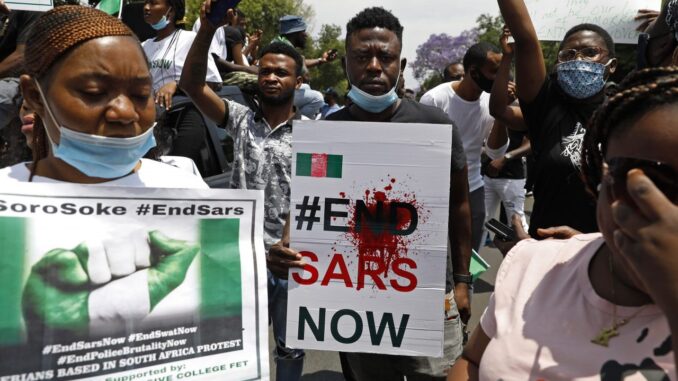
The #EndSARS protests have clearly delineated the terrain regarding a scientific categorisation of a hitherto ignored or dismissed taxonomy. On the one hand are the organisers of the #EndSARS protests – suave, civil, cerebral, upwardly mobile, prosperous without affectation, and technically savvy young men and women. As organisers of the #EndSARS protests, they are united in their resolve to terminate the tyranny of a fascist unit of the Nigeria Police Force. They demanded the dissolution or scrapping of the Special Anti-Robbery Squad (SARS). They also made a number of other popular demands. Nigerians across ideological lines, gender and age massively supported their predilection.
On the other end of the stick is the other category of the Nigerian youth movement. Disingenuously referred to as “hoodlums”, “miscreants”, “thugs”, “looters”, etc. this group consists of the large army of dispossessed individuals or citizens who have been cut off from the economic or social base of society to which they ought to be conjoined or identified. They are truly a product of Nigeria’s warped socio-economic system. Large in number, they represent the true picture of the nation’s lack of preparation for the future. The Nigerian state by her acts of omission or commission has created the environment that produces “hijackers” of peaceful protests, “looters” of COVID-19 palliatives, “attackers” of national flag-waving protesters etc.
All these have been occasioned by the nation’s invidious restriction of the popular democratic space, stifling of popular political education, abjuring of the rule of law, promotion of the enactment of obnoxious laws like the proposed social media regulation, delaying or obstructing vaunted socio-economic and political reforms positioned for ameliorating the condition of the popular masses, denial of basic rights, and seeking to influence or direct, for selfish motives, mass protest movements. The state has further taken advantage of the varied disabilities of this “untrained” body of restive, physically vibrant and easily mobilisable persons as she employs their services as private security guards, Man-Friday or cheer-mongers.
Even as the #EndSARS protests were kick-started by the objective to terminate the vicious rein of the Special Anti-Robbery Squad (SARS), they were protests against an underlying foreground of years of mis-rule or of inept governance. In two fleeting weeks, the young people of Nigeria taught the Nigerian nation enduring lessons in proper governance, transparency, accountability, integrity in conduct and pronouncements. These truly are rare commodities in governance practice in Nigeria.
The melancholic or sombre wing of the youth movement which had sat on the sidelines bemoaning its fate and had waited to see a possible official constructive engagement of the protesters, was enraged by the senseless shooting at the Lekki tollgate venue of the protests. Short-fused, less deliberate than their protesting counterparts, quick to action, and disparagingly referred to as touts, bandits and to denote the carefree, mirthful but savage operational method of certain political actors), this group contributed in a concrete form to the promotion of public consciousness regarding the objectives of the #EndSARS protests.
Though not at the instance or invitation of the peaceful protesters, the participation of this group made an instant impression on the whole world. Attention was immediately drawn to the issues at stake. As numerous public and private assets were assaulted and as the interests of certain persons perceived as obstructing the attainment of the goal of the nationwide protests were attacked, official notice was taken of the seriousness of the #EndSARS advocacy. Government suddenly recognised the importance of summoning town hall meetings and of espousing the values of youth empowerment and the centrality of youth participation in the determination of the relations of production and distribution of resources. Going by its trajectory however, government policy programme enunciation is largely disbelieved or is generally considered as positioned to buy time for the continuation of anti-people or unpopular policies.
It is necessary that synergy between the seemingly divergent dialectics of the youth movement groups be forged as their goal is similar or is, in fact, the same. It will be of great advantage if a symbiotic relationship which recognises the mutuality of the tragedy of a youth mass movement that is factionalised along operational or tactical lines is fashioned. To wit, the two sides have been afflicted in equal proportion by a socio-economic and political environment that has yet to grapple with the dynamics of youth empowerment as the core of national growth and development. A common front by the two arms of a progressive youth movement is sure to produce for Nigeria a dynamic, energetic, goal-focused or result-oriented environment for good governance.
The desideratum for the present generation of youth is to transform their rage, energy and passion into a national mass movement. At the beginning, it may be necessary to forge an alliance with a radicalised petty bourgeois formation. This kind of union must however unify theory and practice because effective mobilisation is possible only by connecting with popular ideas and aspirations. These ideas may be fine-tuned and developed over time to suit the ultimate goal of the youth movement.
The youth should guide against elitism or an unbending belief in an all-time superiority of their position. They must acutely recognise the reality of Nigerian politics especially its violence, corruption, poverty of ideas and illiteracy accompaniments, all which are manipulable by the status quo. The pervasive environment of a sit-tight political class, the questionable independence of INEC, the dubious impartiality of state security, the fawning, sycophantic stance of the police, etc. are all cognizable reality of Nigerian politics.
This dank reality can hopefully be overcome as the youths combine their energy, passion, organisational ability and digital savvy with the collaboration and experiential wisdom of persons and groups from preceding generations who share their values, goals and aspirations.
Rotimi-John, a lawyer and commentator on public affairs, wrote vide lawgravitas@gmail.com
END

Be the first to comment